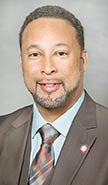Power Play
Published 10:32 am Monday, December 19, 2016
RALEIGH – What began as an effort by the North Carolina General Assembly to help those still suffering from natural disasters statewide has apparently turned into a political power play.
On Tuesday, District 5 NC House Representative Howard Hunter III of Ahoskie joined his elected colleagues at the State Capitol in Raleigh for a Special Session of the General Assembly called by Gov. Pat McCrory.
Hunter said that part of the process was easy as both legislative chambers (House and Senate) overwhelming agreed to approve a $200 million disaster relief package for the ongoing recovery efforts from Hurricane Matthew and the severe wildfires that impacted the mountain region.
“We knew what to expect when it came to approving those funds,” Hunter said on Thursday morning as he was preparing to leave his legislative office in Raleigh for a House committee meeting.
“We were able to commit that $200 million without placing any financial burden on the state’s budget,” Hunter conceded. “The state has well over $1 billion in what is called the Rainy Day Fund.”
The Disaster Recovery Act of 2016 was approved by unanimous votes in both Chambers (115-0 in the House; and 49-0 in the Senate).
However, according to Hunter, things turned “dicey.”
“Just after we finished the work that the governor called us to Raleigh for in the first place, the Republican leadership put together a proclamation for another special session and since they have the majority power in both Chambers, that session was approved,” Hunter said. “It was then that the other shoe dropped.”
In what Hunter referenced as a political power play, Republicans in both Chambers began to file multiple bills. Some, Hunter said, were simply “general housekeeping measures” but the brunt of that proposed legislation appears to favor the work of the outgoing Republican governor while limiting the power of Governor-Elect Roy Cooper (a Democrat).
Among the proposed legislation is making 1,200 of McCrory’s political appointments permanent state employees; granting the NC Senate unprecedented approval over Cooper’s cabinet picks; and removing Cooper’s power to appoint trustees to the UNC board and the state board of education.
Meanwhile, House Bill 6 changes the Department of Information Technology from part of the Governor’s cabinet to an independent agency whose leadership would be chosen by the Republican Lieutenant Governor.
Senate Bill 4 allows McCrory to appoint the chair of the industrial commission before he leaves office and would drastically change the board of elections by giving the General Assembly the authority to choose half of its members.
Senate Bills 5 and 6 grant McCrory the power to appoint two last-second Special Superior Court judges. One of the appointees would be McCrory’s budget director, Andrew Heath.
“We (Democrat members of both Chambers) were blindsided by all of this new, and unexpected legislation,” Hunter said. “There were 28 new bills filed on Wednesday alone.”
Hunter said it was clear to him that the bulk of the proposed legislation is to limit the power in the incoming governor.
“They (Republicans) want to handcuff the new governor, even before he takes office,” Hunter stressed. “Some of this legislation is totally out of left field, to include having the senate, by majority vote, approve all of the governor’s picks for his cabinet.
“And the overhaul of the state Board of Elections is another power play,” Hunter added. “It’s tradition that the majority membership of the state board and county boards (of elections) are controlled by what political party the sitting governor belongs to. Right now that majority lies with the Republicans, but it’s supposed to change to a Democratic majority once Mr. Cooper takes office.”
Hunter said proposed legislation will combine the current state board of election with the state’s Ethics Committee. Four of the eight members will be appointed (two each) by the Speaker of the House and the President Pro Tem of the Senate. Both of those leadership positions are now in the hands of the Republican Party.
He added that the proposed change also impacts each county’s local board of elections. Currently, there are three members on each of those boards. It’s proposed to increase that to four members (two Democrats; two Republicans).
“The Republicans are saying that the Democrats have done the exact same thing in the past when there is a political party transition in the governor’s office,” Hunter said. “My colleagues in the House know that I do not mind at all working across the aisle, using a bi-partisan approach when it comes to doing what’s right for all of North Carolina. But this (changes) is going way off the grid.
“Some Republicans believe that the way to move forward is looking in the rear view mirror; I believe we can’t drive forward looking backwards. In politics there’s always room to agree to disagree, but then there are those that just don’t care. I lose respect for someone like that,” Hunter said.
In response, Robin Hayes, Chairman of North Carolina’s Republican Party, said elections reform requires bipartisan solutions.
“After an extremely close series of elections that inflamed passions on both sides of the aisle, the Republican legislature has proposed something we can all agree on– removing the hyper-partisanship out of our elections administration in order to solve future election concerns in a bipartisan manner,” Hayes said.
“This permanent change in law will forever force North Carolina to address election problems and challenges with a bipartisan consensus, which will provide an opportunity to build faith and trust across the political spectrum,” he added.
Hayes said he wanted to remind the statewide press of the infamous “Christmas massacre” – when then Governor-Elect Jim Hunt, succeeding a Republican governor, demanded the firings/resignations of hundreds of state employees before he took the oath of office.
“Later, Mr. Hunt’s fellow Democrats passed a law for the political based firing of any state employee hired during the previous five years,” Hayes said.




